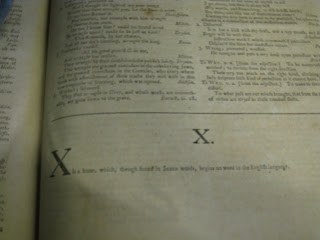







So it turns out London is a linguist's (or lexicographer's) paradise! I've just returned from a week-long trip there with my family, and learned a whole lot about both Egyptian hieroglyphic script and the first real dictionary of the English language. I thought I'd share, and suggest, perhaps, a field trip!
The first awesome thing about London is that there are a million different people there from every corner of the world, so walking down the street you hear every language imaginable--from German to Arabic to Urdu. I guess that's not much different from New York, except the distribution of languages is different (there's a LOT of Arabic, and a LOT of Hindi or Urdu, as well as a higher concentration of non-Spanish Romance languages).
But unlike New York, London can claim possession of the original Rosetta Stone! I saw it at the British Museum, and made my sister take like a billion pictures of me in front of it. Here's one:
I've also included a picture of one of the signs posted on the exhibit, which explains the basics of how the Egyptian hieroglyphic script works. The reason the Rosetta Stone is so important is that it helped scholars (specifically, British scientist Thomas Young and French scholar Jean-François Champollion) to finally decipher hieroglyphics in 1822. The stele, created in 196 BC, records a decree of Ptolemy V in three different written languages: ancient Greek (interestingly, I believe this was the language used by the Egyptian government at the time), and the two Egyptian language scripts, hieroglyphic and Demotic. (Hope I explained that correctly... you might want to fact check because I'm not sure whether hieroglyphic and Demotic are different scripts or both different scripts and different languages. I do know Demotic comes later in Egyptian history). Anyway, scholars had difficulty deciphering hieroglyphics for many years, as the sign reads:
"...Because hieroglyphic signs look like pictures, they assumed that all hieroglyphs were images recording ideas without language. In fact hieroglyphs recorded the ancient Egyptian language with a mixture of sound and picture signs." The word cat is written by combining the signs standing for the sounds /mi/ + /i/ + /w/ as well as the picture sign for "cat" (as shown, as picture of a cat). Incidentally, the Egyptian word for cat would sound something like "miw." It's easy to tell this word was derived from the "meow" sound made by cats!
While in London, we also made a trip to the 17 Gough Square home of Dr. Samuel Johnson, where he wrote the first real dictionary of the English language over the course of nine years, from 1746 to 1755. Other English dictionaries had been published before, but never an authoritative one on the scale and scope of Johnson's. Johnson most notably included quotations from great works of English literature to illustrate his definitions of particular words. The first edition of Johnson's A Dictionary of the English Language contained over 110,000 quotations! This practice was considered innovative, and its influence has endured to the present day; the Oxford English Dictionary today continues to include quotations with many of its definitions.
But I found Johnson's treatment of word definitions even more interesting. Originally, Johnson believed that there were "at most seven different senses of a word." He identified the "natural and primitive signification," the "consequential meaning," the "metaphorical sense," the "poetical sense," the "familiar sense," the "burlesque sense," and "the peculiar sense, in which a word is found in any great author" (I like that one). But eventually he realized how limited his semantic philosophy was, and eventually came to permit as many definitions as he could find. Ultimately, he listed 134 definitions for the verb "to take," which took up roughly 8,000 words (and five whole pages) in his dictionary! As we know, words with multiple meanings can have their definitions listed in dictionaries in one of any number of different orders (the particular order depends on the choice of the publisher)--chronologically, in order frequency, etc. Johnson chose to list his definitions from the most tangible, literal sense of a word to the most literary, figurative, or abstract sense.
Today Johnson's dictionary is still praised for both the literary merit and thoroughness of its definitions. Just don't look for any entries under "X," since Johnson believed no real English words began with the letter! Johnson, a real character whose sense of humor always shone through in his definitions (he defined the word "oats" as "a grain, which in England is generally given to horses, but in Scotland supports the people"), defined lexicographer in his dictionary as "a harmless drudge." The irony is hilarious; he proved lexicographers to be anything but that!
--Amy